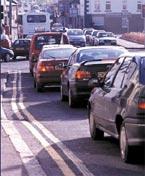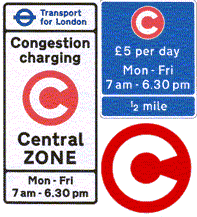THE PEDESTRIAN LIBERATION FRONT
Tue. June 1, 2004Categories: Abstract Dynamics
“I’ve always wanted to see London with treees growing out of the streets and no traffic at all. I don’t like cars zooming around in London, think of all that road space being turned into gardens where you could walk or cycle, I think it would be a much nicer place to live.”

My friend Diane reminded me yesterday of a remark Mrs Thatcher once made. “If I see a man over the age of twenty-five on a bus,” the architect of the ‘Great Car Economy’ proclaimed, ‘I think: there is someone who failed.'”
Well, as someone well over the age of twenty-five who is neither able to drive nor to afford a car, there is yet another mark of my failure.
It’s no accident that Thatcher should have made cars so central to her political-economic project. The philosophical underpinning of Thatcherism was ‘methodological individualism’ (the belief that the individual, not the group, was the basic unit of social analysis, which yielded her infamous dictum, ‘There is no such thing as society’) and the automobile is the physical instantation of that ontology. By contrast, public transport, supposedly cramped and dirty, was held to be a symptom and symbol of the collectivist vision which had failed.*
Tory supporter Gary Numan provided Thatcherite-Reaganite ‘minimal selfishness’ with its uneasy hymn. ‘Here in my car/ I can lock all the doors…. I can only receive.’ (Perhaps this goes some way to accounting for the perpetual fascination that Numan’s track has exercised over the minimal selves in rap).
A couple of years ago, during the course of an encomium to his beloved suburbs written in the Tate magazine, J. G. Ballard sneered at a London which he described as a benighted, sluggish behemoth, its arteries clogged by traffic crawling along at an average speed of 4 mph. He was right. While there’s a natural fit between suburbs – designed and built with cars in mind, providing quick and efficient access to the motorways, retail parks and marinas of Ballard’s Britain – cars and London don’t mix. The streets in London, especially in North London, are cramped and narrow, built for horses, not motor vehicles. The car keeps London gridlocked into a dysfunctional twentieth century, lending support for Ballard’s view that it is the suburbs, not the metropolises, which are the harbingers of the future.
The pedestrian finds the city an inhospitable place, and not only because of the lack of public toilets in central London. It’s worse in the suburbs and retail parks where, as in the States, walking marks you out as a dangerous social outcast. As Iain Sinclair points out in some of the most hilarious pages in London Orbital, if a pedestrian should manage to penetrate the perillous labyrinth of roads enveloping Bluewater, they are treated as some kind of aberration.

All of this is a preamble to a cheer for the congestion charge. Ken deserves a vote for this act of political courage alone. I doubt that there is another policy in recent memory which is so clearly in the public’s long-term best interest but which would inevitably meet with large-scale popular opposition. Here was a measure taken without regard for political expediency, and which could easily have cost Livingstone his job, his reputation and his popularity.
The car lobby is the backbone of conservative middle England, as Blair found out to his cost three years ago when he went head to head with them in the fuel protests. Witness the likes of Richard Littlejohn’s incessant whingeing about the ‘victimization’ of the motorist and the recent furore about speed cameras. (The same people who insist on the letter of the law being applied without mercy in the case of drug use somehow think drivers should be granted much more latitude, as if speeding were a victimless crime).
It’s worth comparing the status of motorists to that of smokers. Smokers are increasingly treated as pariahs – the ban on smoking in public places insituted in many cities in America and imposed more recently in Eire looks set to be adopted in Britain, and militants aside, most smokers accept that smoking is a bad habit. But drivers are unrepetant, convinced that driving is an inalienable right and an unquestionable good.
There is no doubt a place for cars. In suburban and rural areas, where public transport is infrequent, they are indispensable. I enjoy travelling on fast roads with music blasting from the stereo as much as anyone else. But it’s the default ubiquity of cars that must be broken.
There are so many arguments against cars. It’s not only that they pollute (with noise pollution an insidious but seldom considered aspect of this: imagine how much more pleasant London would be without the ceaseless, grim drone of traffic), there’s also health to consider (doesn’t the recent hysteria over childhood obesity illustrate the rightness of Ken’s reported derision for parents driving kids to schools in 4 by 4s – most school journeys involve a distance of less than a mile?) and even security (if the current crisis in Saudi Arabia doesn’t highlight the pressing need to investigate alternative sources of energy, then I don’t know what will).
Zizek refers somewhere to an sf story in which, when travellers wind down the window of their car, they find that the apparently vibrant social world outside disappears, to be replaced by a blank void. When they wind the window up again, the world returns. As Zizek says, this captures the ‘ontological experience’ of travelling in a car: the curious sense that the world outside is a projection on a screen, a kind of videogame reality.
But it isn’t. Walking through the city remains a pleasure, and would be an even greater one if there were fewer cars.
*Despite the constant sniping, I don’t actually share this view of public transport. It gets me to work smartly every morning and gets me around London very efficiently. Not that it – especially the Tube – couldn’t be improved, of course, but continually complaining about it just feeds the complacency and triumphalism of the carocrats.
Absolutely 100% bang-on.
And also that quote from Thatcher proves, once again, that she was and is and irredeemable c*nt.
I notice that Zizek has decided to resurrect Lenin.
Well, I’m not responsible for _everything_ he writes!
here in my car
K-punk puts this all in exactly the right way, and sets my mind going in all sorts of directions, because the car is such a core structural component, and abstract model of PoMo individual identity and its problems. A few…
I didn’t say you were! I was just wondering if you knew, that’s all. Anyway, he has. In a book, no less.
Besides, I agree about the congestion charge and about public transport. I would’ve agreed with you about cars until I passed my driving test. Most people I know with actual jobs in the city, however, never dream of doing anything as mad as driving to work. I mean, parking alone costs an arm and a leg (if you can find somewhere to park).
Then I again, I know about, uh, 2 people with jobs in the city. I have, though, talked to about 10. Oh, nevermind. Forget it.
Going to and from work by public transport (train, preferably) is one of life’s great luxuries. When you’re driving, you can’t do anything apart from listen to the radio and curse at the congestion. Public transport affords you time to read or do stuff to boring to do at home, when other options are available. In my case, doing solfeggio.
Absolutely….
But what’s solfeggio?
Oliver, do you want to meet up soon? I’m on holiday currently…. Great post on Wolfowitz btw… Better by a country mile than anything in the papers needless to say….
Ooh, thanks. I thought I’d further alienated my core vote, but maybe I’ll just about survive, again.
Of course! Next week, maybe? I’ll let you know what my work rosta is when I find out. Luke’s away, but Jim’s around too.
How on earth did he get into the mausoleum carrying a pail of chicken’s blood and a copy of the Bible in reverse?
Phil, think I must have missed a step????
Oliver, anyone with half a brain must appreciate the quality of writing and thinking in that Wolfowitz piece ….
Next week is good — my workload’s like really low this time of year (the manic depressive life of a teacher) — what dept of Foyles do you work in btw? I’ve been in a couple of times looking for you on the off chance when I was passing.
maths/physics/astronomy/technical/transport: that general area, all at the back of the first floor, when I’m not taking tea or lunch or flirting or visiting a friend.
Oh don’t worry Mark, it was just a poor joke wondering how Zizek was planning to resurrect Lenin…
“Sol`feg´gio
Noun 1. solfeggio – singing using solfa syllables to denote the notes of the scale of C major”
I meant it in the sense of doing boring sight-reading exercises. I kept the singing in my head though….
Adventures in Solipsism
1.Boy in the Bubble The one constant thought in my childhood was that of solipsism. I was constantly troubled by the thought that my perception could be counterfeit in its entirety, that I might be the subject of a cruel…
I think you’ll find it was Loelia, Duchess of Westminster.